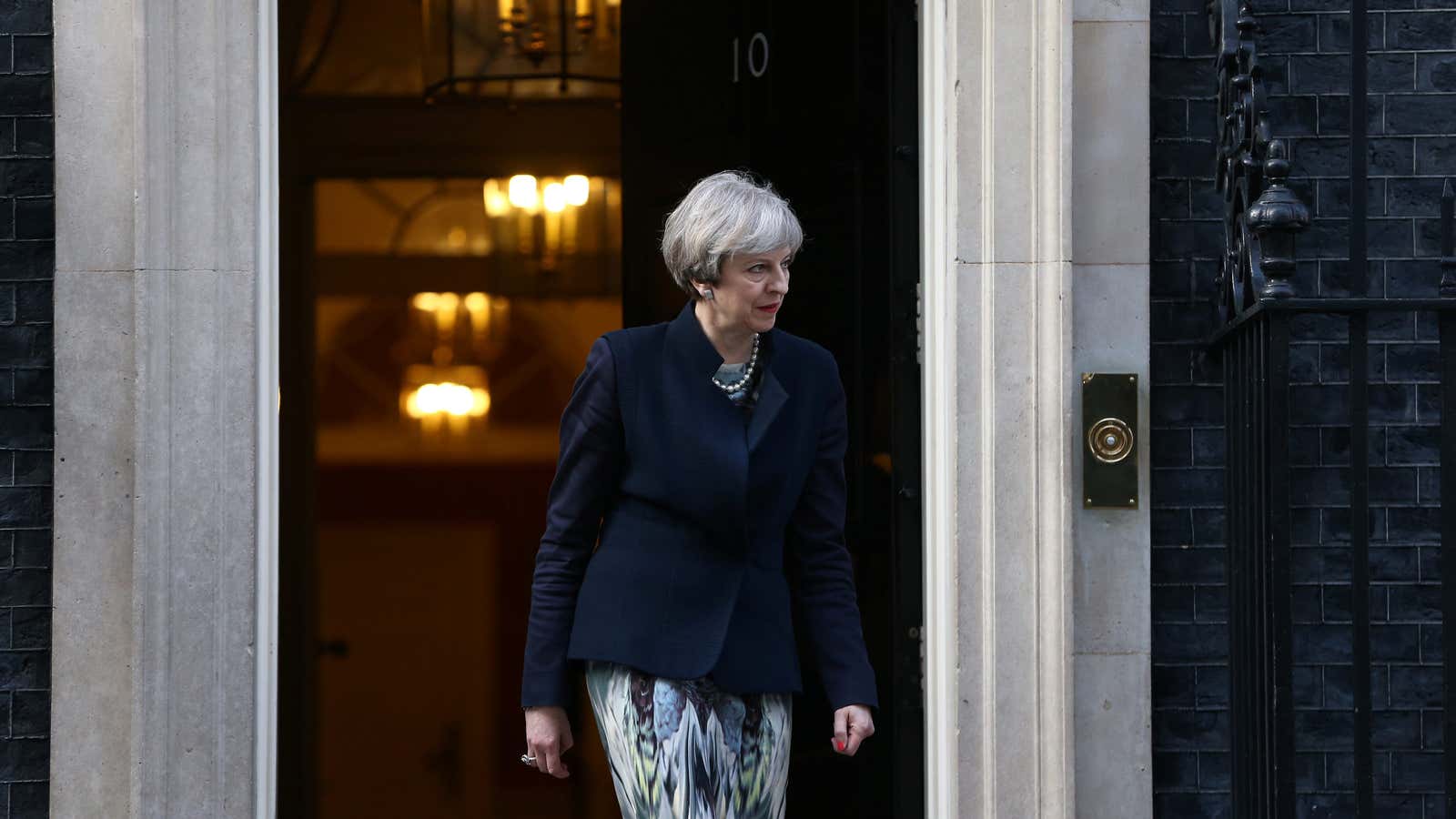The week from hell has finally arrived for UK prime minister Theresa May. On Tuesday (March 28), the day before she plans to trigger Article 50, officially notifying the European Union (EU) of Britain’s intention to leave, the Scottish parliament voted to push for a second independence referendum. The vote highlights the formidable task ahead for the prime minister: May has to negotiate Brexit whilst scrambling to save her country’s own centuries-old union.
The results of the Brexit referendum last June pointed to and aggravated a deep divide among UK countries: England and Wales voted to leave the EU, while Scotland and Northern Ireland chose to remain. Nationalists in Scotland and Northern Ireland have seized on this situation to kickstart their own campaign to leave the UK.
Today’s vote notwithstanding, a Scottish referendum on whether to leave the UK can’t happen without the UK’s approval. Scotland’s parliamentary motion, which passed with a comfortable majority, merely calls for ”discussions with the UK government on the details” of a second referendum. For her part, May dismissed Sturgeon’s demand for a second independence referendum, saying “now is not that time.” She defended the union of the UK during a visit to Scotland this week, arguing that the four nations of the UK are an “unstoppable force” when they work together.
While May pledged to fight for the “precious, precious union” of the UK in Scotland, another problem for the union is brewing in Northern Ireland. Sinn Fein, the Irish Republican Party that wants to reunify Ireland, called for a referendum on a united Ireland. The criteria for Northern Ireland to have a referendum on Irish reunification is clear. There can be a border poll if there’s a shift in public opinion, and Sinn Fein has argued that the Brexit vote has made a united Ireland a possibility again.
Likewise, hours after the Brexit referendum results were announced, Scottish first minister Nicola Sturgeon warned that the option of a second independence referendum was now “on the table.”
Both movements have utilized the main argument put forward by Brexitors—the need to take back control. Scotland and Northern Ireland, the nationalists argue, are being taken out of the EU against their will. In the case of Scotland, rule from a remote and elitist London is a particularly thorny issue; the Conservatives last won a majority in Scotland in 1955, yet the Scots have since had to bear a succession of Conservative Party prime ministers. The problem for May, as the Economist noted today, is that every argument she uses against the EU “can be used against her by Nicola Sturgeon.”
Sturgeon criticized May for working on special deals to protect the benefits of EU trade for key industries such as car manufacturers (paywall), but refusing to hold any constructive talks with Scotland.
May’s insistence that the four nations are stronger within the union of the UK rings hollow to a region that is particularly vulnerable (pdf) to the risks posed by Brexit. Northern Ireland exports over 40% of its goods to the EU and would be the second worst affected region—behind Wales—by the loss of EU funds. (Since 1995, Northern Ireland has received €1.3 billion, or $1.4 billion, in financial support.) And it’s not just the economy; with the Good Friday Agreement and the launch of the single market, people and goods could travel freely from Northern Ireland and the Republic of Ireland—a right that’s now threatened by Brexit.
May dismissed calls for a border poll with the same argument she used against the Scots, insisting it was “not the right time,” but she has offered no concrete answers to the question of Northern Ireland’s economy and the once-contentious border. A snap election in Northern Ireland last month ushered in a new political reality—for the first time, unionists no longer have an overall majority in the Northern Ireland majority.
May has no slogans to turn to that will ease her formidable task. She will have to find a way to make the argument that these nations are stronger within a long-standing union—the UK—whilst insisting the UK itself will be stronger outside another long-standing union, the EU.
